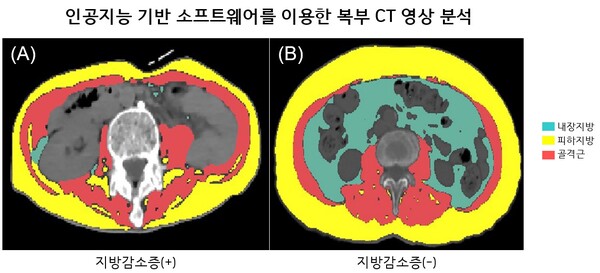Patients with amyotrophic lateral sclerosis (ALS), also known as Lou Gehrig’s disease, have shorter survival times if they have adipopenia, a new study showed. Adipopenia refers to the deficiency of adipose (fat) tissues. The findings provide a new perspective for predicting the prognosis of patients with ALS.
Seoul National University Hospital’s joint research team, led by Professors Choi Seok-jin and Sung Jung-joon of the Department of Neurology and Professors Lee Jong-hyuk and Yoon Soon-ho of the Department of Radiology, analyzed abdominal CT images of ALS patients using AI-based software to determine the association of adipopenia and sarcopenia with ALS prognosis.

ALS is a fatal neurodegenerative disease that progressively deteriorates motor nerve cells in the brain and spinal cord. Initially, motor nerves and muscles experience a gradual decline, starting with the limbs, and by the second to the fifth year of the disease, even the respiratory muscles become paralyzed, resulting in death due to respiratory failure.
The incidence of ALS rises notably in individuals aged late 50s and onwards, with approximately twice as many male patients as female patients.
Korea reports around 500 new cases of ALS each year, and the total number of prevalent patients in the country remains relatively low, at approximately 3,000, primarily due to the disease's short survival period.
Patients diagnosed with ALS who experience rapid weight loss or have a low Body Mass Index (BMI) tend to have a less favorable prognosis. Nevertheless, it's important to note that BMI, as a measure combining both muscle and body fat weight, may not effectively differentiate between the impact of muscle loss and fat loss on the prognosis.

To confirm this, the researchers analyzed the body composition, including muscle mass and body fat, of 80 patients with ALS who visited the Department of Neurology at Seoul National University Hospital between 2010 and 2021. Then, they evaluated whether they had sarcopenia or adipopenia using AI-powered software based on abdominal CT images.
The results of the body composition analysis showed that both muscle mass and fat mass were associated with BMI. However, blood creatinine concentration was only associated with muscle mass. This indicator could be useful for monitoring muscle mass loss in patients with ALS, the researchers said.
When analyzing the impact of sarcopenia and adipopenia on survival, the researchers found that, after adjusting for other variables, the risk of death increased by about six times in patients with adipopenia. The median survival time for those with and without adipopenia was 5.5 months and 35 months, respectively.
In contrast, sarcopenia was not significantly associated with survival, meaning that body fat was an independent predictor of survival in patients with ALS.
When the researchers again analyzed the survival of only those patients who required a gastrostomy, they found that the risk of death was increased by about 15 times in those who did not have adipopenia.
Gastrostomy is a medical procedure involving the insertion of a tube connected to the stomach through an opening in the abdominal wall. This procedure is typically carried out in patients with ALS who encounter challenges with swallowing and require a means of receiving adequate nutrition.
"These results show that quantitative analysis of muscle mass and body fat may be helpful in stratifying patients with ALS according to prognosis and predicting long-term prognosis," said Professor Choi. "Further research is needed on the effects of fat metabolism on the pathophysiology of ALS and clinical studies on optimal nutritional management strategies for ALS patients."
Professor Lee of Radiology said the study was significant in that it showed AI-based CT body composition analysis can accurately predict the progression and prognosis of ALS.
"We hope to secure a higher level of evidence through multicenter studies and actively use it in clinical practice."
The study was published online in the Annals of Neurology, the official journal of the American Academy of Neurology.

